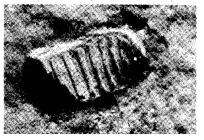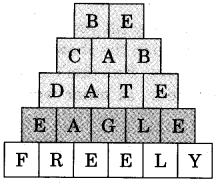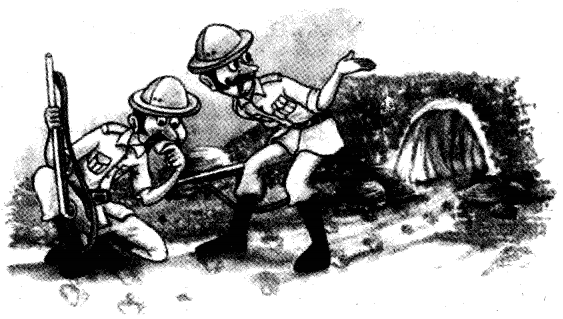NCERT Solutions for Class 5 English Unit 3 Chapter 2 Robinson Crusoe
Class 5 English Chapter 2 Robinson Crusoe Questions From Textbook Solved
Let’s Read
Question 1.
What made Robinson Crusoe think that the print on the ground was a footprint?
रॉबिनसन क्रूसो ने ऐसा क्यों सोचा कि धरती पर वह चिह्न या निशान पदचिह्न था?
Answer:
Robinson Crusoe thought so because it had every part of a foot-toes, heel, etc.
Question 2.
Why was Robinson afraid when he looked at the bushes and trees?
रॉबिनसन को झाड़ियों और पेड़ों को देखकर डर क्यों लगा था?
Answer:
Robinson was afraid because he mistook every bush and tree to be a man following him.
Question 3.
Why did Robinson pray when he saw the footprint?
पदचिह्न को देखकर रॉबिनसन ने प्रार्थना क्यों की?
Answer:
Robinson thought that it was the footprint of a savage. He became afraid that the savage would come to him with other savages and kill’him. And therefore he began to pray for his safety.
Question 4.
Choose the correct answer. सही उत्तर को चुनिए।
(i) Robinson ran back to his home, as fast as he could because he
(a) was racing
(b) was afraid
(c) was in a hurry to go home
(ii) He could not sleep because
(a) there was an animal outside his cave
(b) he thought savages had come from the mainland
(c) his bed was uncomfortable.
(iii) Why was Robinson Crusoe sure that it was not his footprint?
(a) It didn’t like a human footprint.
(b) It looked smaller than his.
(c) He had not come to this part of the beach in a long time.
(iv) Where was Robinson Crusoe?
(a) On a boat.
(b) In a town.
(c) Alone on an island.
(d) On an aeroplane.
Answer:
(i)—(b);
(ii)—(b);
(iii)—(c);
(iv)—(c)
Let’s Talk
Question 1.
How would you feel if you saw unknown footprints outside your front door?
अंपने दरवाजे के सामने किसी अनजान पदचिह्न को देखकर आपको कैसा अनुभव होगा?
Answer:
I would be surprized. I would try to find them out.
Question 2.
If you were alone at home and suddenly someone knocked at your door, what would you do?
यदि आप घर पर अकेले हों और अचानक किसी ने आपका दरवाजा खटखटा दिया तो आप क्या करेंगे?
Answer:
I would peep through the hole made in the door. If he/she is one of my family members or relatives, I would open the door. Otherwise I would ask him/hername and purpose of visit and then would say to him/her to come later in the presence of my parents.
Let’s Write
Question 1.
The words in the sentences are jumbled. Write them in order. One is done for you.
इन वाक्यों में शब्द अव्यवस्थित रूप से दिए गए हैं। उन्हें व्यवस्थित करके लिखिए। आपकी सहायता के लिए एक दिया गया है।
(i) alone was not Robinson an island on Robinson was not alone on an island.
(ii) was island the inhabited
(iii) footprint to someone this belonged
(iv) I around me looked
(v) I went the towards footprint large
(vi) was afraid I now
Answer:
(ii) The island was inhabited.
(iii) This footprint belonged to someone.
(iv) I looked around me.
(v) I went towards the large footprint.
(vi) Now I was afraid.
Question 2.
Fill in the blanks with the correct word.
सही शब्द से रिक्त स्थानों को भरिए। and but because so
(i) I was frightened _______ curious.
(ii) I decide to go to the beach _______ I went along the water’s edge.
(iii) I ran as fast as I could _______ I was frightened.
(iv) I was very tired _______ confused.
Answer:
(i) but
(ii) so
(iii) because
(iv) and
Question 3.
Write a story on strange footprints.
आश्चर्यजनक पदचिह्नों पर एक कहानी लिखिए।
- Where did you see the footprints?
- What sort of a day was it?
- Did you see them at night?
- What happened when you followed the footprints?
- What did you see?
- What happened then?
Answer:
One evening when I came back from my tuition classes I saw some footprints made with thick mud on the stairs. I was surprized to see such large footprints?
I could not guess whose footprints were those. They were certainly not my father’s or my elder brother’s. I followed the footprints and came to my door. I saw a tall and healthy middle aged man standing there. When I asked him who he was, he told me that he was a gentleman. But right now he was seeking my help because everything belonged to him was looted while he was waiting for the train on the railway station. The man had just come and was going to press the call bell. As soon as he looked at me, he got nervous and told me his pathetic story. Meanwhile my mother had opened the door. She took pity on the man and gave him food and clothes and some money. The man went away giving me his blessings.
Question 4.
Use the joining words given below and join the sentences in Column A and B.
नीचे दिए गए संयोजक शब्दों का प्रयोग करते हुए कॉलम A और B में दिए गए वाक्यों को जोड़िए।
| or and so but because |
| A | B |
| (i) I can sing well. | I forgot to post it. |
| (ii) She wore a raincoat. | It was raining |
| (iii) We may go to Shimla. | He was late to school. |
| (iv) He wanted a book for his birthday. | We may go to Darjeeling. |
| (v) He missed the school bus. | He wanted a football for his birthday. |
| (vi) I wrote the letter. | I can’t dance at all. |
eg: I wrote the letter but I forgot to post it.
Answer:
(i) I can sing well but I can’t dance at all.
(ii) She wore a raincoat because it was raining.
(iii) We may go to Shimla or we may go to Darjeeling.
(iv) He wanted a book and a football for his birthday.
(v) He missed the school bus so he was late to school.
(vi) I wrote the letter but forgot to post it.
Fun Time
Question 1.
Look at the footprint shown here.
यहाँ दर्शाए गए पदचिह्न को देखिए।
Hint: This is the footprint of the first man on the moon.
His name was Neil Armstrong.
Question 2.
Let’s create a pyramid!
आओ एक पिरामिड बनाएँ।
Use the following clues.
निम्नलिखित संकेतों का प्रयोग कीजिए।
(i) A two letter word beginning with B.;
(ii) A three letter word beginning with C.
(iii) A four letter word beginning with D.
(iv) A five letter word beginning with E.
(v) A six letter word beginning with F.
Answer:
Let’s Work in Pairs
Have a conversation with your partner based on the picture below. You can start as—
Answer:
Hunter 1 : “Look at the footprints in the mud!”
Hunter 2 : They appear to be of a cub.
Hunter 1 : It means the tiger has gone out in search of prey leaving the cub behind in the cave.
Hunter 2 : You’re right. In the absence of its mother the cub is wandering here and there out of the cave.
Hunter 1 : Where may be the cub?
Hunter 2 : Let’s search it in every bush.
Hunter 1 : Here is it! Hurry up! Catch it up!
Hunter 2 : Now we should leave the forest immediately.
Robinson Crusoe Summary In English
Robinson Crusoe had been living alone on an island for a long time because his ship had been destroyed by the sea. He wanted company to overcome his loneliness. One day he saw a footprint on the sand. He was sure that it was the footprint of a man. He searched for more footprints but couldn’t find any. He got frightened. He ran back to his cave. He could not sleep that night. He thought that the footprint could be one of the savages of the mainland who had wandered out to the sea in a small boat. What would happen if he came with other savages and killed him? He began to pray for protection. Now he felt a little bolder. He wanted to see the footprint again. So, one day he went out to the sea-shore and decided to measure it with his own footmark. He came closer to it and realised that it was not his footprint because he had not come to inat part of the beach. Moreover, the footprint was bigger than his own footprint. Now, he became sure that someone lived on the island. He got frightened again and went back to his cave.
Robinson Crusoe Summary In Hindi
रॉबिनसन क्रुसो लम्बे समय से एक टापू पर अकेले रह रहा था क्योंकि उसका जहाज समुद्र द्वारा नष्ट कर दिया गया था। अकेलापन को दूर करने के लिए वह किसी का साथ चाहता था। एक दिन उसने रेत पर एक पदचिह्न देखा। वह पूरी तरह से आश्वस्त था कि पदचिह्न किसी मानव का है। उसने और भी पदचिह्न खोजा किन्तु एक भी नहीं पाया। वह बुरी तरह से डर गया। वह अपनी गुफा की ओर दौड़ गया। उस रात वह सो नहीं सका। उसने सोचा कि यह पदचिह्न मुख्यभूमि के जंगली आदमियों में किसी का होगा जो छोटी-सी नाव में घूमता हुआ समुद्र की ओर आ गया होगा। क्या होगा अगर वह अन्य जंगली आदमियों के साथ आ जाए और उसे मार डाले? वह अपनी सुरक्षा के लिए प्रार्थना करने लगा। अब वह कुछ ज्यादा साहसी हो गया। वह फिर से पदचिह्न देखना चाहता था। अतः एक दिन वह समुद्र तट पर गया और उस पदचिह्न को अपने पदचिह्न से नापने का निर्णय लिया। वह पदचिह्न के काफी नजदीक आया और महसूस किया कि वह उसका पदचिह नहीं था क्योंकि वह तो तट के उस भाग में आया ही नहीं था। और तो और वह पदचिह्न उसके पदचिह्न से बड़ा था। अब उसे पक्की विश्वास हो गया कि टापू पर कोई रहता है। वह फिर डर गया और अपनी गुफा में चला गया।
Class 5 English Chapter 2 Robinson Crusoe Hindi Translation Of The Lesson
1. Robinson Crusoe’s ship had been destroyed by the sea. He had been alone for many years and longed for company. One day he discovers a footprint on the sand. Let’s find out what he did then.
Word-Meanings-Destroyed (डेस्ट्रायड)—ruined, नष्ट हो गया। Longed (लांग्ड)-wished for, इच्छा करता था। Discovers (डिस्कवस)-finds out, पाता है। Footprint (फूटप्रिंट)-पदचिह्न।।
अनुवाद : रॉबिनसन क्रुसो का जहाज समुद्र द्वारा नष्ट कर दिया गया था। वह बहुत सालों से अकेला रह रहा था। और किसी का साथ चाहता था। एक दिन रेत पर उसे एक पदचिह्न मिला। आओ पता करें कि उसके बाद उसने क्या किया।
2. One day, when I was going towards my boat, I was surprised to see the footprint of a man on the sand. I stood amazed! I listened; I looked around me; I could neither hear nor see anything. I went up higher to look down; I went up the shore and down the shore, but it was no good; I could find no other footprint but that one. I went to it again to see if there were any more footprints and to tell it it had been my imagination. But I was not mistaken, for there was exactly the print of a foot-toes, heel, every part of a foot. I could not imagine how it came there.
Word-Meanings-Amazed (अमेज्ड) surprised, हैरान रह गया। Shore (शोर)-bank of the sea, तट। Exactly (इग्जैक्टलि) वास्तविक, ठीक-ठीक। Heel (हील)–back part of the human foot, एड़ी।
अनुवाद : एक दिन मैं अपनी नाव की ओर जा रहा था, तो रेत पर मानव पदचिह देखकर हैरान रह गया। मैं दंग होकर खड़ा हो गया। मैंने सुना; मैंने अपने चारों तरफ देखा; मैं न तो कुछ सून सका और न ही कुछ देख सका। मैं नीचे देखने के लिए ऊँचाई पर गया; मैं समुद्रतट परे इधर-उधर गया किन्तु सब बेकार हो गया; मैं उस एक पदचिह्न के अतिरिक्त और कोई पदचिह्न नहीं पाया। मैं यह देखने के लिए उसके पास फिर गया कि कोई और पदचिह्न तो नहीं है और यह स्पष्ट करने कि कहीं यह मेरी कल्पना तो नहीं है। किन्तु मुझसे कोई गलती नहीं हुई थी क्योंकि वहाँ पर वस्तुतः एक पैर का चिह्न था-उँगुलियाँ, एड़ी, एक पैर का प्रत्येक भाग। मैं कल्पना नहीं कर पा रहा था कि आखिर वह वहाँ आया कैसे।
3. I stayed a long time thinking, but became more and more confused. At last I returned home very frightened, looking behind me after every two or three steps, mistaking every bush and tree to be a man.
When I came to my cave (which I called my castle), I ran inside it, as if I was being chased. I do not remember whether I used the ladder or went it by the hole in the rock, which I called the door. I ran for cover, faster than any animal could run.
Word-Meanings-Confused (कनफ्यूज्ड)–उलझन में। Frightened (फ्राइटेन्ड) afraid, डरा हुआ। Castle (कैसल)—fort, दुर्ग। Chased (चेज्ड)-ran after, पीछा किया जाना।
अनुवाद : मैं काफी देर तक खड़ा सोचता रहा किंतु इससे मेरी उलझन और अधिक बढ़ती गई। अंत में मैं भयभीत घर लौट आया। मैं हर दो-तीन कदमों के बाद पीछे मुड़कर देखता था और प्रत्येक झाड़ी और पेड़ को गलती से आदमी समझ बैठता था।
जब मैं अपनी गुफा (जिसे मैं अपना दुर्ग कहता था) के पास आया, मैं उसके अंदर ऐसे दौड़ गया जैसे कोई मेरा पीछा कर रहा हो। मुझे यह भी याद नहीं कि मैंने सीढ़ी का प्रयोग किया था या चट्टान के छेद के रास्ते (जिसे मैं दरवाजा कहता था) अंदर गया था। सुरक्षा के लिए मैं इतना तेज भागा जितना एक जानवर भी नहीं भाग सकता।
4. I did not sleep that night. The more I thought about what I had seen, the more afraid I became. I thought it could be one of the savages of the mainland who had wandered out to the sea, in a small boat. Luckily I was not on shore at that time, but what if he had seen my boat! If he had seen the boat he would have realised that someone lived on the island and would soon return with others to kill and eat me.
Word-Meanings-Savages (सैवेजेज)-wild people, जंगली लोग। Mainland (मेनलैण्ड)मुख्य भूमि। Wandered (वान्डर्ड)-went here and there, इधर-उधर घूमता रहा। Realised (रिअलाइज्ड)felt, महसूस किया।
अनुवाद : उस रात मैं सो नहीं सका। जो मैंने देखा था उसके बारे में जितना ही सोचता था उतना ही भयभीत हो रहा था। मुझे लगा कि वह मुख्यभूमि के जंगली लोगों में से किसी का होगा जो छोटी-सी नाव में घूमता हुआ समुद्र में आ गया होगा। सौभाग्यवश उस समय मैं तट पर नहीं था, लेकिन अगर उसने मेरी नाव देख ली होगी तो क्या होगा? अगर वह नाव देख लिया होगा तो उसे पक्का विश्वास हो गया होगा कि टापू पर कोई रहता है और बहुत जल्दी दूसरे जंगली लोगों के साथ आकर मुझे मार डालेगा और खा जाएगा।
5. And so I lay fearful for many days and prayed for protection. In doing so, I was much comforted and began going out to investigate. But even now as I went forward, I looked behind me frequently, because I was still very frightened.
However, as I went about for two or three days and saw nothing I became a little bolder. I decided to go down to the shore again and examine the footprint once more. I decided to measure it with my own footmark.
Word-Meanings-Fearful (फिअरफुल) afraid, डरा हुआ। Protection (प्रोटेक्शन)—सुरक्षा। Comforted (कम्फर्टेड)-relaxed, राहत महसूस किया। Investigate (इनवेस्टिगेट)-examine, पता करना, जाँच करना। Forward (फॉरवॉड) ahead, आगे जाना। Frightened (फ्राइटेन्ड)-afraid, डरा हुआ। Examine (एग्जामिन)-look carefully, जाँच-पड़ताल करना।।
अनुवाद : और इसलिए मैं बहुत दिनों तक भयभीत पड़ा रहा और अपनी सुरक्षा के लिए प्रार्थना करता रहा। ऐसा करने से मुझे बहुत राहत महसूस हुआ और मैंने जाँच-पड़ताल करना शुरू कर दिया। लेकिन इसके बावजूद जब मैं आगे बढ़ा, अपने पीछे बार-बार मुड़कर देखता रहा क्योंकि मैं अभी भी डरा हुआ था। फिर भी जब मैं दो-तीन दिनों तक इधर-उधर भटका और कुछ भी नहीं देखो तो मैं थोड़ा साहसी हो गया। मैंने समुद्र तट पर जाकर पदचिह्न को एकबार फिर से देखने का निर्णय ले लिया। मैंने अपने पदचिह्न के साथ उसे मापने का निश्चय कर लिया।
6. As I came closer to the footprint, I realised that it could not be my footprint because I had not come to this part of the beach since a long time. Secondly, as I placed my foot alongside that footprint, it seemed larger than my own. My fear returned! I went home again, believing that there were someone there. The island was inhabited!
Word-Meanings-Closer (क्लोजर) nearer, और अधिक नजदीक। Inhabited (इनहैबिटेड) with people or animals living there, बसा हुआ।
अनुवाद : जैसे ही मैं पदचिह्न के काफी करीब गया तो मुझे लगा कि वह मेरा पदचिह नहीं हो सकता क्योंकि मैं बहुत समय से तट के उस भाग पर गया ही नहीं था। दूसरी बात यह थी कि जब मैंने अपना पैर उस पदचिह्न पर रखा तब वह मेरे से बड़ा जान पड़ा। मेरा भय वापस आ गया। मैं फिर इस विश्वास के साथ घर चला गया कि वहाँ कोई रहता था। टापू बसा हुआ था!










